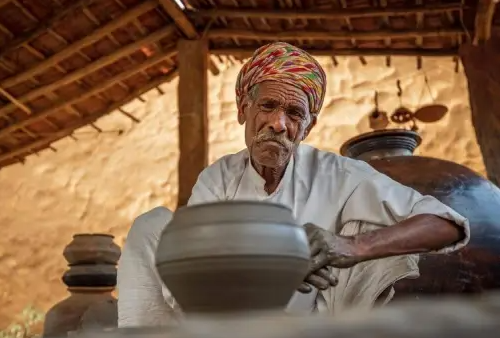Craft Revival Trust: A Beacon for Traditional Artisans in Modern Times

Introduction
In the midst of a rapidly modernizing world, there exists a constant tug-of-war between tradition and innovation. Among the entities that champion the cause of tradition, especially in the realm of arts and crafts, stands the Craft Revival Trust. A beacon for artisans and traditional craft enthusiasts, this organization plays a pivotal role in preserving, promoting, and proliferating age-old crafts and practices. Dive into the world of the Craft Revival Trust and discover its vital contribution to the global craft landscape.
Also Read:- NYC Art & Craft Market
India – the land of cultural benefactors and rich diversity with its written history, which can be talked about for years, stands on the frontline regarding arts and crafts. Its diverse and renowned rich cultural heritage is shaped by years of history, various religious and philosophical traditions, and many regional customs and practices. Religion and spirituality, architecture, classical arts, traditional crafts, festivals, cuisine, and clothing are just a glimpse of India’s vast and diverse cultural heritage that continues to evolve and thrive, blending tradition with modern influences. Be it the Ikat paintings of Odisha; the Kalamkari works of Andhra Pradesh or the Veenas of Thanjavur – the country takes pride in its cultural heritage and works towards preserving and promoting it for future generations.
Key Endeavors
- Documentation: The trust undertakes extensive documentation of various crafts, ensuring that the knowledge and techniques do not get lost in time. This includes recording techniques, histories, and the cultural significance of various crafts.
- Digital Archives: Craft Revival Trust boasts a vast digital archive that provides access to articles, visuals, research papers, and more – serving as a reservoir of knowledge for researchers, students, and enthusiasts.
- Promotion and Marketing: In an era dominated by digital marketing, the trust helps artisans navigate this new terrain, ensuring that their products reach a broader audience, both locally and internationally.
- Workshops and Training: By conducting regular workshops, the trust ensures that skills are not only preserved but also passed on to the younger generation, ensuring continuity.
- Collaborations: Partnering with other organizations, institutions, and governments, the trust amplifies its impact and broadens its reach.
But initiatives such as cultural festivals, craft fairs, art exhibitions, and skill development programs aim to create awareness, generate market demand, and provide economic opportunities for traditional artisans. Additionally, government interventions, policy reforms, and support for documentation and preservation can play a vital role in reviving and sustaining traditional arts in India. But times are changing. Catching up to the speed of the 21st century with its rapid globalisation and influx of capital has been a major development when it comes to better living conditions and technology-wise. But this has been affecting local artisans and traditional arts for the longest time possible. While India has a rich and diverse heritage of traditional art forms and houses lots of artisans, there have been instances of neglect and challenges faced by this sector of the community. But efforts are being made by various organisations, NGOs and individuals to address the challenges and revive interest and return to its cultural importance and prodigy. One such organisation is the Craft Revival Trust (CRT) which strives to safeguard the intangible cultural heritage of India.
Established in 1999, the Craft Revival Trust is a non-profit organisation based in India that works towards preserving and promoting traditional Indian crafts. The flagbearer for this initiative is Dr Ritu Sethi, to revitalise and sustain India’s rich cultural heritage. CRT was built on the foundation to access knowledge and learn more about the intangible cultural heritage of traditional arts and crafts and to safeguard them. The belief is that the cultural heritage of crafts and artisans plays a vital role in the contemporary world – not just as a mere aesthetic or a cultural past but also as a dynamic participant in its economic future and continuing sustainable development. CRT works to achieve this through areas extending from research and documentation, policy and advocacy to consultancy.
The Craft Revival Trust focuses on a range of Indian-craft-related issues, including lobbying, research, documentation, and teaching. Its main goal is to help the artisans who engage in traditional arts and crafts and raise awareness of them among the coming generations. The organisation believes that India’s crafts and its rich cultural heritage are an important component of its cultural history and its stature as a country on the map of the world; this would provide millions of artists with a good source of income nationwide. It conducts in-depth investigations of traditional crafts and meticulous recording of their designs, methods, and historical backgrounds. The foundation houses a collection of craft-related resources, which is open to academics, researchers, and the general public, including photos, manuscripts, and oral histories.
In addition to research and documentation, CRT also works on capacity building and the skill development of artisans. To improve the technical abilities of craftsmen, provide them with design input and establish market connections, it holds workshops, training programmes, and seminars. The group is dedicated to empowering craftspeople and making sure they are paid fairly for their labour. The CRT also engages in outreach and advocacy efforts to spread the word about the value of traditional crafts. It works with governmental organisations, non – governmental organizations, and other stakeholders to create policies and initiatives that promote the craft industry. To safeguard the rights of crafters and maintain the long-term sustainability of traditional crafts, the organisation advocates for sustainable practices, moral sourcing and fair-trade ideals.
CRT’s mandate is manifest through these routes mainly:
- Asian InCH Encyclopedia: Encyclopedia of Intangible Cultural Heritage: an archival blog which started almost two decades ago is the widest and the most in-depth encyclopedia of the ICH of traditional arts, crafts and textiles of India and seven other countries across the South-Asian region. This one-of-a-kind archival website brings together contributors and academics from all over the world to contribute to the goal in the making and provide a contemporary platform to express concerns.
- India InCH: Address Directory: Traditional Craftspeople, Weavers, and Artists across India: A comprehensive database of over 70,000 traditional artisans, weavers, and artists working in more than 2500 categories are listed on India InCH.
- Global InCH Journal: International Journal of Intangible Cultural Heritage: The Craft Revival Trust is now publishing the online quarterly- Global InCH Journal. With a distinguished galaxy of contributors, the Global InCH Journal chronicles living traditions and the issues that impact the wide domain of intangible heritage.
- Advocacy and Policy
- Consultancy
- Platforms of Dialogue and Discussion
Initiatives such as cultural festivals, craft fairs, art exhibitions, and skill development programs aim to create awareness, generate market demand, and provide economic opportunities for traditional artisans. Additionally, government interventions, policy reforms, and support for documentation and preservation can play a vital role in reviving and sustaining traditional arts in India. Overall, the Craft Revival Trust plays a crucial role in the preservation and promotion of traditional Indian crafts. It seeks to establish a thriving ecosystem that honours and upholds India’s rich craft legacy through its research, documentation, capacity building, and advocacy program.









